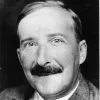Men’s ideas are like card-playing or any other game. Ideas which in the past I’ve seen considered reckless have since become commonplace, almost trivial, and adopted by men unworthy of sharing them. Ideas which now seem extraordinary will be regarded feeble and perfectly ordinary by our descendants.
[Les idées des hommes sont comme les cartes et autres jeux. Des idées que j’ai vu autrefois regarder comme dangereuses et trop hardies, sont depuis devenues communes, et presque triviales, et ont descendu jusqu’à des hommes peu dignes d’elles. Quelques-unes de celles à qui nous donnons le nom d’audacieuses seront vues comme faibles et communes par nos descendans.]Nicolas Chamfort (1741-1794) French writer, epigrammist (b. Nicolas-Sébastien Roch)
Products of Perfected Civilization [Produits de la Civilisation Perfectionée], Part 1 “Maxims and Thoughts [Maximes et Pensées],” ch. 2, ¶ 145 (1795) [tr. Parmée (2003), ¶ 115]
(Source)
(Source (French)). Alternate translations:Men’s ideas are like cards and other games. Ideas which I remember to have seen regarded as dangerous and over-bold have since become commonplace and almost trite, and have descended to men little worthy of them. So it is that some of the ideas which to-day we call audacious will be considered feeble and conventional by our descendants.
[tr. Hutchinson (1902), "The Cynic's Breviary"]Man's ideas are like card & other games. Ideas which I once heard stigmatised as dangerous and over-daring have since become common and even trivial, and have sunk to be the tenets of quite unworthy persons. Some ideas which we call audacious nowadays will seem feeble and ordinary to our descendants.
[tr. Mathers (1926)]The ideas of men are like cards and other games. ideas that at one time, to my own knowledge, were considered dangerous and rash, have since become general, almost commonplace, and have descended to men who are little worthy of them. Some of those that we call daring will seem feeble and ordinary to our descendants.
[tr. Merwin (1969)]The ideas of men are like cards and other games. Some ideas, which formerly I observed to be considered dangerous and intemperate, have since become universal, even trivial, and have been adopted by men scarcely worthy of them. Some notions which we call bold will be regarded as feeble and commonplace by our descendants.
[tr. Pearson (1973)]
Quotations about:
triviality
Note not all quotations have been tagged, so Search may find additional quotes on this topic.
Many of us affect a tone of irony about gadgets, as if we lived always in realms above and dealt with trifles only during rare descents from sublime thoughts. The truth is that more and more of the important things in life turn on pinpoints. Our frustrations begin in trivialities — a telephone out of order, a car that will not start, a claim check whose number has been misread. The thing in cellophane that cannot be got at — plain to the sight but sealed like an egg — is the modern version of the torture of Tantalus. Catastrophes we will deal with like heroes, but the bottle top that defies us saps our morale, like the tiny arrows of the Lilliputians that maddened Gulliver and set his strength at naught.
Jacques Barzun (1907-2012) French-American historian, educator, polymath
God’s Country and Mine, Part 3, ch. 12 (1954)
(Source)
O human beings, you’re born to fly straight up,
Why does a little gust of wind bring you down?
[O gente umana, per volar sù nata,
perché a poco vento così cadi?]Dante Alighieri (1265-1321) Italian poet
The Divine Comedy [Divina Commedia], Book 2 “Purgatorio,” Canto 12, l. 95ff (12.95-96) (1314) [tr. Bang (2019)]
(Source)
Some translators have this as a comment by Dante on how few takers there are to the Angel of Humility's invitation to ascend higher; others, including most modern translators, make it part of the Angel's speech.
(Source (Italian)). Alternate translations:Ye Souls for Heav'n design'd! ye Sons of Day!
Why should a random breeze o'erset your fail
When heav'n-ward bound?
[tr. Boyd (1802), st. 18]O ye race of men
Though born to soar, why suffer ye a wind
So slight to baffle ye?
[tr. Cary (1814)]O human race! whose birthright is to soar,
How little wind will make your course give o'er!
[tr. Bannerman (1850)]O human creatures, born to soar aloft,
Why fall ye thus before a little wind?
[tr. Longfellow (1867)]O race of men, born to fly upward, why at a little wind fall ye so down?
[tr. Butler (1885)]O human race, though born above to soar,
Why at the slightest breath dost thou thus fall ?
[tr. Minchin (1885)]O human race, born to fly upward, why before a little wind dost thou so fall?
[tr. Norton (1892)]O human folk, born to fly upward, why at a breath of wind thus fall ye down?
[tr. Okey (1901)]O race of men, born to fly upward, why do you fall back so for a little wind?
[tr. Sinclair (1939)]O human spirits, upward born to spring,
Why fall ye down at a brief blast of air?
[tr. Binyon (1943)]O human race, born to take flight and soar,
Why fall ye, for one breath of wind, to earth?
[tr. Sayers (1955)]O sons of man, born to ascend on high,
how can so slight a wind-puff make you fall?
[tr. Ciardi (1961)]O race of men, born to fly upward,
why do you fall so at a breath of wind?
[tr. Singleton (1973)]O race of men, born to fly heavenward,
how can a breath of wind make you fall back?
[tr. Musa (1981)]O human race, born to fly upwards,
Why do you fall at such a little breeze?
[tr. Sisson (1981)]O humankind, born for the upward flight,
why are you driven back by wind so slight?
[tr. Mandelbaum (1982)]O human race, born to fly upward, why do you fall at so little wind?
[tr. Durling (2003)]O human race, born to soar, why do you fall so, at a breath of wind?
[tr. Kline (2002)]O human nature! You are born to fly!
Why fail and fall at, merely, puffs of wind?
[tr. Kirkpatrick (2007)]O race of man, born to fly on high,
why does a puff of wind cause you to fall?
[tr. Hollander/Hollander (2007)]O human race, born to fly on high,
How can the slightest breeze blow dust in your eyes?
[tr. Raffel (2010)]
For one’s emotional state is always determined by the oddest and most accidental things, and it is precisely the most superficial factors that often fortify or diminish our courage.
Stefan Zweig (1881-1942) Austrian novelist, playwright, journalist, biographer
Beware of Pity (1939)
(Source)
A cloudy day, or a little sunshine, have as great an influence on many constitutions as the most real blessings or misfortunes.
Joseph Addison (1672-1719) English essayist, poet, statesman
Essay (1711-09-05), The Spectator, No. 162
(Source)
On Venice Beach, Alice and the girls and I once saw a man blowing truly spectacular soap bubbles the size of watermelons — still the symbol for me of the tendency of people in Southern California to become awfully good at something that isn’t terribly important.
Calvin Trillin (b. 1935) American journalist, humorist, novelist
Travels with Alice, ch. 10 (1989)
(Source)
Great causes are never tried on their merits; but the cause is reduced to particulars to suit the size of the partisans, and the contention is ever hottest on minor matters.
Ralph Waldo Emerson (1803-1882) American essayist, lecturer, poet
“Nature,” Essays: Second Series (1844)
(Source)
Good manners are made up of petty sacrifices.
Ralph Waldo Emerson (1803-1882) American essayist, lecturer, poet
“Social Aims,” lecture, Boston (1864-12-04), Letters and Social Aims (1875)
(Source)
It is the trifles of life that are its bores, after all. Most men can meet ruin calmly, for instance, or laugh when they lie in a ditch with their own knee-joint and their hunter’s spine broken over the double post and rails: it is the mud that has choked up your horn just when you wanted to rally the pack; it’s the whip who carries you off to a division just when you’ve sat down to your turbot; it’s the ten seconds by which you miss the train; it’s the dust that gets in your eyes as you go down to Epsom; it’s the pretty little rose note that went by accident to your house instead of your club, and raised a storm from madame; it’s the dog that always will run wild into the birds; it’s the cook who always will season the white soup wrong — it is these that are the bores of life, and that try the temper of your philosophy.
Ouida (1839-1908) English novelist [pseud. of Maria Louise Ramé]
Under Two Flags, ch. 1 (1867)
(Source)
Indeed, if we consider the unblushing promises of reward and the staggering nature of the rewards promised in the Gospels, it would seem that Our Lord finds our desires not too strong, but too weak. We are half-hearted creatures, fooling about with drink and sex and ambition when infinite joy is offered us, like an ignorant child who wants to go on making mud pies in a slum because he cannot imagine what is meant by the offer of a holiday at the sea. We are far too easily pleased.
For to a great man both things are needful; to treat trifles as trifles and important matters as important matters.
[Denn zu einem großen Manne gehört beides: Kleinigkeiten als Kleinigkeiten, und wichtige Dinge als wichtige Dinge zu behandeln.]
Gotthold Lessing (1729-1781) German playwright, philosopher, dramaturg, writer
Hamburgische Dramaturgie [Hamburg Dramaturgy], Essay 34, 1767-08-25 (1767-1769) [tr. Zimmern (1890)]
(Source)
(Source (German)). Alternate translations:For the great man does both, that is, he treats trivialities as trivialities and important things as important things.
[tr. Arons/Figal]It is the mark of great people to treat trifles as trifles and important matters as important.
[Source]
For want of a naile the shoe is lost, for want of a shoe the horse is lost, for want of a horse the rider is lost.
George Herbert (1593-1633) Welsh priest, orator, poet.
Jacula Prudentum, or Outlandish Proverbs, Sentences, &c. (compiler), # 499 (1640 ed.)
(Source)
We recognize that there are no trivial occurrences in life if we get the right focus on them.
Mark Twain (1835-1910) American writer [pseud. of Samuel Clemens]
The Autobiography of Mark Twain, Vol. 1 (2010)
(Source)
The human animal, like others, is adapted to a certain amount of struggle for life, and when by means of great wealth homo sapiens can gratify all his whims without effort, the mere absence of effort from his life removes an essential ingredient of happiness. The man who acquires easily things for which he feels only a very moderate desire concludes that the attainment of desire does not bring happiness. If he is of a philosophic disposition, he concludes that human life is essentially wretched, since the man who has all he wants is still unhappy. He forgets that to be without some of the things you want is an indispensable part of happiness.
Bertrand Russell (1872-1970) English mathematician and philosopher
Conquest of Happiness, Part 1, ch. 2 “Byronic Unhappiness” (1930)
(Source)













